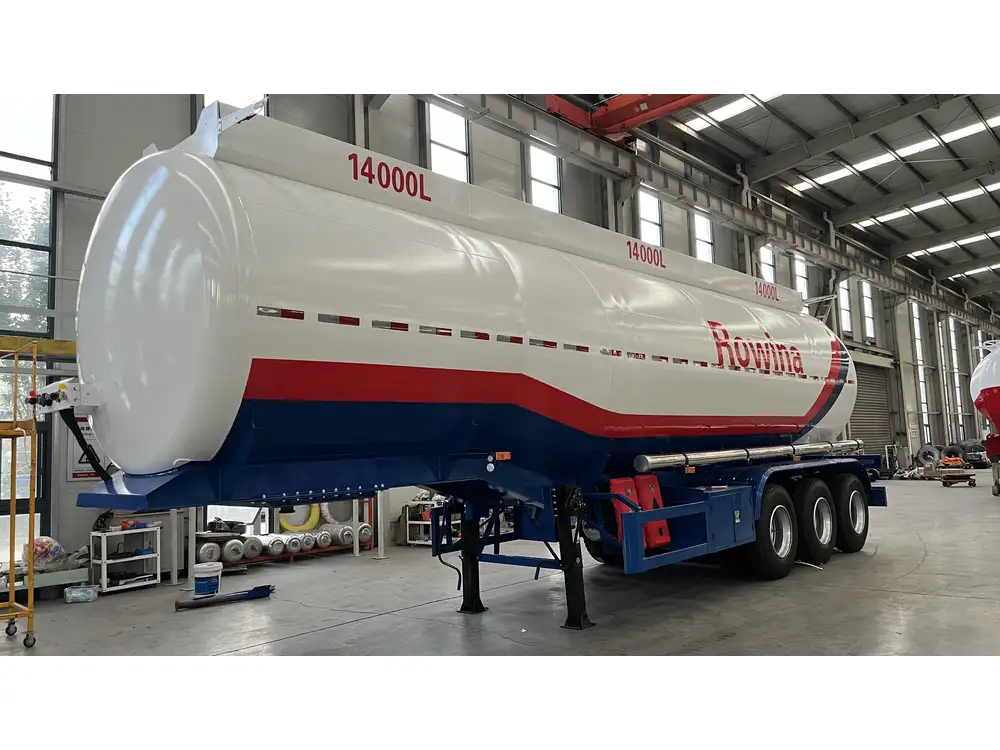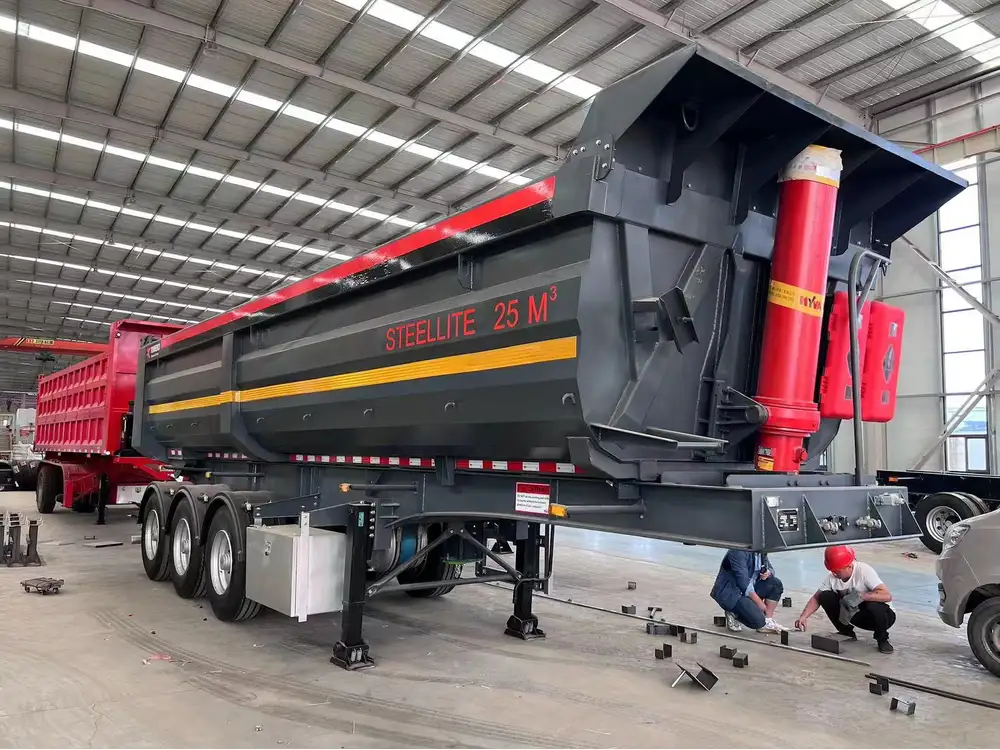When it comes to transporting heavy loads, whether for construction, landscaping, or personal projects, having the right equipment is essential. One of the most critical pieces of equipment is the dump trailer. If you own a 1-2 ton truck, choosing the ideal size dump trailer can significantly impact efficiency, safety, and overall productivity. This article will guide you through the critical factors to consider when selecting a dump trailer, ensuring a perfect fit for your truck.
Understanding Dump Trailers
What is a Dump Trailer?
Dump trailers are specialized trailers designed to carry and unload materials through a hydraulic lift system. They come in various sizes and configurations to suit different needs, from small landscaping jobs to substantial construction projects. For those with a 1-2 ton truck, understanding the weight capacity and dimensions of dump trailers is crucial.

Different Types of Dump Trailers
Single Axle Dump Trailers: Ideal for lighter loads, single axle trailers typically have a lower weight capacity (around 3,000 – 6,000 pounds) and are easy to maneuver.
Tandem Axle Dump Trailers: These trailers can carry heavier loads (ranging from 7,000 to 20,000 pounds). They offer better stability and weight distribution, making them suitable for larger projects.
Gooseneck Dump Trailers: These are ideal for 1-2 ton trucks due to their improved maneuverability and higher load capacities. Gooseneck options often allow for greater towing capacity and can be customized in various lengths and configurations.
Assessing Your Truck’s Capabilities
Weight Limitations
Before purchasing a dump trailer, understanding your truck’s specifications is essential. Consult your truck’s manual for the Gross Vehicle Weight Rating (GVWR). For 1-2 ton trucks, this typically ranges from 6,000 to 12,000 pounds.
| Truck Type | Typical GVWR | Payload Capacity | Recommended Dump Trailer Size |
|---|---|---|---|
| 1 Ton Truck | 10,000 lbs | 3,000 – 5,000 lbs | Up to 5,000 lbs |
| 1.5 Ton Truck | 12,000 lbs | 5,000 – 8,000 lbs | Up to 7,000 lbs |
| 2 Ton Truck | 14,000 lbs | 8,000 – 10,000 lbs | Up to 10,000 lbs |

Towing Capacity
The towing capacity of your truck directly confines the size and weight of the dump trailer it can handle. For instance, a standard 1-ton truck might tow a trailer that weighs up to 5,000 pounds effectively, while a 2-ton truck could manage a significantly heavier load.
Selecting the Proper Size Dump Trailer
Load Volume and Dimensions
An integral factor in selecting a dump trailer is its load volume, which relates directly to the dimensions of the trailer box. Knowing the types of materials you plan to carry is vital for sizing.

Material Types
| Material Type | Wet Weight (lbs/yd³) | Suggested Dump Trailer Size |
|---|---|---|
| Soil | 2,000 | 5-6 cubic yards |
| Gravel | 1,500 | 4-5 cubic yards |
| Sand | 1,600 | 4-5 cubic yards |
| Mulch | 800 | 3-4 cubic yards |
Note: Always consider the material density when determining the load capacity of your trailer.
Trailer Dimensions
Most dump trailers range in size from 5 to 14 feet long. For fitting a 1-2 ton truck, a trailer that is approximately 6 to 10 feet long is optimal. Key dimensions can include:
- Length: Make sure it provides enough room for your intended loads but doesn’t exceed your truck’s towing capabilities.
- Width: Typically 6.5 to 8 feet, ensuring compatibility with most loads.
- Height: Height can affect loading and unloading efficiency, influenced by the types of materials you regularly transport.
Hydraulic Systems and Features

Importance of Quality Hydraulic Systems
Hydraulic systems are critical for the efficient dumping of materials. Look for trailers equipped with high-quality hydraulic pumps and cylinders, which ensure smooth operation and longevity. A more robust hydraulic system will enhance the dump trailer’s functionality, particularly when dealing with heavier loads.
Additional Features to Consider
- Tarp System: Protect your load during transit and prevent debris from blowing away.
- Ramps: Consider a dump trailer with rear/load ramps for ease of access.
- Side Extensions: For added load capacity, opt for trailers that offer removable side extensions.
Customization Options
Many manufacturers offer customizable dump trailers to meet specific user needs. Options include:
- Brakes: Electric brakes can be beneficial for larger loads, enhancing safety.
- Powder Coating: Protect your investment against rust and corrosion.
- Extended Warranties: Ensure long-term reliability and service.

Regulatory Considerations
Local Regulations
Many states have specific regulations concerning trailer size, weight, and load limits that should be reviewed before making a purchase. It is advisable to check the following:
- Maximum allowable trailer size
- Weight limits on public roads
- Licensing requirements for trailers
Trailer Registration
Ensure your trailer complies with your state’s registration requirements, including any necessary inspections. This often involves providing details such as:
- VIN number
- Weight capacities
- Load ratings

Costs and Investment Considerations
Budgeting for a Dump Trailer
Investing in a quality dump trailer is, in essence, a business decision. Prices can vary based on size, manufacturer, and features but typically range as follows:
| Trailer Size | Price Range |
|---|---|
| Small (3-6 ft) | $2,000 – $4,500 |
| Medium (7-10 ft) | $4,000 – $8,000 |
| Large (Over 10 ft) | $7,000 – $15,000+ |
Financing Options
If the upfront costs are prohibitive, consider financing options, including loans and leases that allow you to manage payments over time.

Maintenance and Care
Routine Maintenance Tips
To ensure your dump trailer remains in peak condition, proper maintenance is crucial. Consider the following tips:
- Regular Inspections: Check brakes, hydraulics, and tires frequently for wear and tear.
- Cleaning: Remove debris and wash down the trailer after hauling materials.
- Storage: If the trailer won’t be used for an extended period, store it indoors to protect it from the elements.
Common Repairs
Be aware of common repair needs. Hydraulic system issues, brake replacements, and tire troubles are not uncommon, so budget for these potential expenses as part of your ownership experience.

Conclusion
Choosing the right size dump trailer for your 1-2 ton truck is critical for optimizing your hauling capabilities, enhancing productivity, and ensuring safety on the road. By assessing your truck’s specifications, understanding your hauling requirements, and considering your budget, you can make a well-informed decision that keeps your operations running smoothly.
In the vast world of construction and landscaping, the right dump trailer acts not just as a tool but as an extension of your business—capable of tackling your toughest jobs with efficiency and reliability. Whether you choose a single axle for smaller jobs or a tandem axle for more substantial work, investing time in selecting the perfect trailer will ultimately pay dividends in both performance and productivity.



